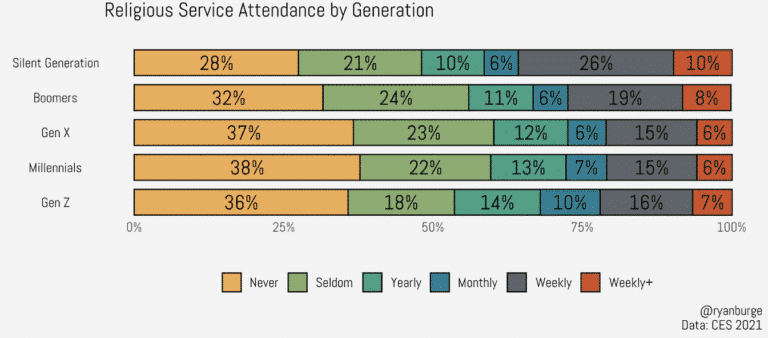Are the trends reversing? Could younger people return to church in greater numbers? Perhaps. It’s too early to tell, but one researcher gives a little hope. Ryan Burge reported on data indicating Gen Z is more likely to attend church than Millennials and Gen X. While almost a third of this younger generation does not claim a particular religion (the “nones”), they attend religious services at a slightly higher rate than their Millennial and Gen X parents.
More research is needed as this data could be an aberration. Two caveats are in order. First, Gen Z religious attendance has been trending down, not up. Second, not every member of Gen Z is included in this data as some are too young to be present in the measurements. One data point does not make a trend, but this one is worth watching over the next few years.
At Church Answers, we wanted to know more. So we asked a Gen Zer his thoughts. This video is the second installment of a three-part Church Answers YouTube series on Gen Z. Check out our channel to see the other videos.
Posted on April 19, 2023
As President of Church Answers, Sam Rainer wears many hats. From podcast co-host to full-time Pastor at West Bradenton Baptist Church, Sam’s heart for ministry and revitalization are evident in all he does.
More from Sam






1 Comment
While this is interesting in a small way, it would be helpful to look at Millenials’ behaviors at the same point developmentally in their own lifespans. In other words, while the numbers show Gen Z showing slightly higher attendance rates the Millenials, it is possible that the rate for Millenials was also higher 15 years ago at the same point in their lives. So, is it up at all or just an illusion? Your article rightly says more info is needed, but it may be that the premise is comparing apples to oranges in some ways and int 15 years, Gen Z rates will be lower then they are now (which is likely based on statistical trends – but not a given). Thanks for publishing these. As a former engineer who was raised by two math majors, I like data and while this is iffy and too early to draw conclusions about, it is still interesting and perhaps helpful too. Thanks.